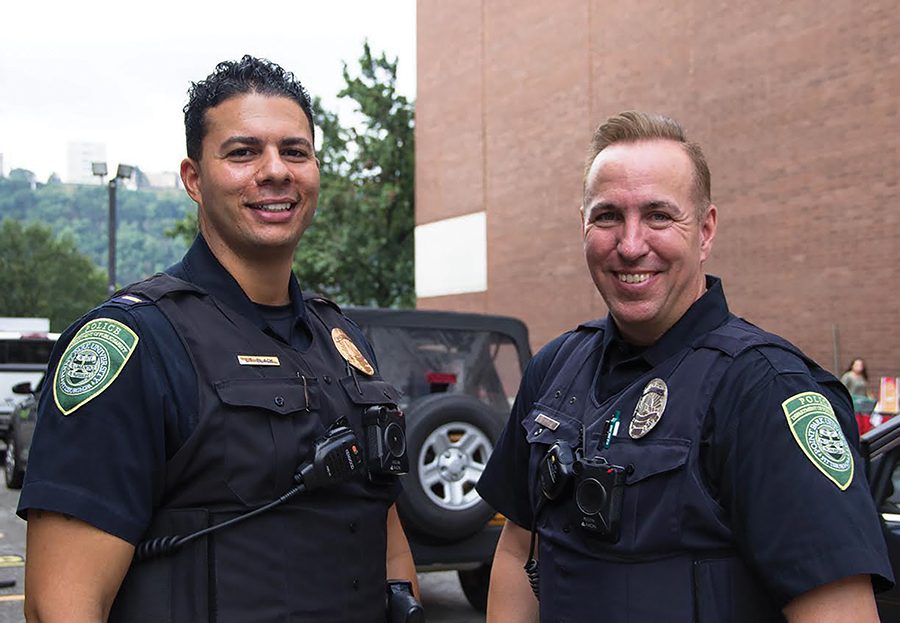Opioid overdose antidote Narcan now available to university police
Photo by Chloe Jakiela
Point Park police officers Lt. Nicholas Black and Alex Lee show off their body cameras on Move In Day, which they have worn since Aug 1. The newest requirement for officers is to carry a heroin OD antidote, Narcan.
October 4, 2016
In an effort to stay ahead of the opioid epidemic in Pennsylvania, university police are now trained to administer the opioid antidote Narcan. The department will keep the antidote in centrally located campus buildings and inside patrol cars.
“It’s unfortunate how popular [heroin] is in Allegheny County due to its low cost,” Lt. Nicholas Black of Point Park Police said. “We’re downtown so we assist the city with incidents as well,” Black said.
Narcan is the brand name for Naloxone Hydrochloride. The drug is used to treat overdoses of heroin and other opioids by competing with the opioid when binding to brain receptors. All officers attended a hands-on training that included a PowerPoint presentation and practice administering on manikins.
In 2014, Gov. Tom Wolf signed David’s Law. This bill permits officers and firefighters to carry Narcan in their vehicles. One year later on Oct. 7, 2015, Wolf signed a statewide order permitting pharmacies to carry the antidote. Since these passings, some state and Allegheny County police departments have started carrying Narcan.
“It doesn’t mean that we believe we have a problem, because we don’t,” said Vice President of Student Affairs and Dean of Students Keith Paylo. “But it is my and Student Affairs’ philosophies that our students’ safety and health comes first.”
Pennsylvania ranks inside the top 20 states in America for overdose mortality rates, according to a University of Pittsburgh study. The Allegheny Health Department reported 422 overdose deaths in 2015, of which 246 were caused by opiates. Heroin alone was responsible for 209 deaths last year.
“We have not had an overdose issue on campus, but our officers also are patrolling part of Downtown Pittsburgh,” said Jeffrey Besong, chief of police and vice president of Public Saftey at Point Park, in a press release. “Equipping our officers with Narcan puts them in a position to save lives, as police often are first responders for incidents involving overdoses.”
The application of Narcan adds to the list of security advancements made by Point Park Police since the summer. Recent advancements include placing body cameras on officers and purchasing a new patrol car.
“I believe we are leading the charge in things like this,” Paylo said. “Along with other campuses… I really appreciate what our Police Department is doing here to be leaders on campus; other schools come to us and ask opinions on police force which is the highest compliment to receive.”
In the past five years Point Park has made numerous attempts to increase security. Efforts include creating the Sexual Harassment and Rape Program, increasing the number of officers on staff and developing the Alert, Lockdown, Inform, Counter and Evacuate (ALICE) training video on how students and faculty should handle an active shooter situation.
Junior marketing major Clarence Jones feels the department is successful at maintaining a safe environment on campus.
“With there being Pittsburgh police patrolling the areas off-campus and then to have police on campus; it’s like two armies fighting a war for our safety,” Clarence said.
In 2016, the National Campus Safety Summit ranked the department sixteenth out of 4,700 schools in the country. Point Park is also one of seven federally accredited university police departments in the state of Pennsylvania.














